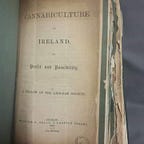Hemp Shortages In Ireland During The 1940's
By Brian Houlihan
(Please consider becoming a patron to support the creation of more unique content)
During the 1940’s many countries across the world experienced hemp shortages and Ireland was no exception. The outbreak of World War Two and the geopolitical turmoil this caused played a large role in these shortages. Not only was hemp in high demand for military purposes but its supply from Asia was restricted during this period.
In the USA this led the government to release the famous ‘Hemp For Victory’ film in 1942 which encouraged farmers to grow hemp. While many hemp activists are aware of the revival of hemp in America during the war, few know about the impact it had in other countries including Ireland.
As a newly independent state Ireland was already undergoing economic hardships prior to the war, or ‘The Emergency’ as it was officially called. During the war Ireland remained neutral which added to its trade difficulties, especially with Britain. However, many historians regard Ireland as being ‘benevolently neutral’ as in reality it aided the Allies in multiple ways.
The high demand for hemp, the difficultly in obtaining it from traditional sources and the trade difficulties imposed by the war meant Ireland had a shortage of hemp (and other items) throughout the 1940’s and even into the 1950’s. At the time a limited amount of hemp was growing here. Notably in the 1930’s University College Cork experimented with hemp growing.
In Ireland hemp goods were widely used for industrial and personal applications in areas such as fishing, tailoring, shoe-repairs, sacks, plumbing, electronics and more. Some of these goods (or parts of) were made domestically but most were imported which meant the war had a significant impact on supplies.
These shortages led to restrictions being placed on numerous goods. In August 1941 the trade and use of sacks made from hemp (and other materials) was restricted by the Minister for Supplies. During the war customers and farmers were encouraged to return any sacks or similar items used.
The hemp shortages led to many people contacting their local politicians to raise their concerns. Shown below is a letter printed in The Kerryman in February 1942. It’s a letter received by the politician Fionan Lynch from the Department of Agriculture after he made representations on behalf of one of his constituents.
In the letter Mr. Lynch is informed that internationally “the general shortage of such materials is acute” and that it’s doubtful there is any immediate prospect of “supplies being made available for export to this country”.
Later that year in December 1942 the Minister for Supplies (and future Taoiseach) Sean Lemass was asked two questions about these supply problems by his fellow politicians John Flynn and Seán Broderick during a Dáil discussion.
Mr. Flynn asked Mr. Lemass if was aware of the hardship imposed on fishermen, harness-makers and shoemakers by the shortage of hemp supplies.
Mr. Broderick highlighted the hardship caused to the salmon-fishing industry by the non-granting by the British authorities of licences for the export of good quality hemp for nets. Mr. Broderick also outlined that the hemp now available is “of such poor quality that the fishermen do not consider it worth while to fish with it”
Mr. Lemass replied that he had contacted the British authorities but didn’t believe flax or hemp would be released for any of these purposes. He added that supplies of cotton were being targeted in order to provide some relief. However, it was pointed out to Mr. Lemass that cotton was “absolutely useless for drift-net fishing” by Mr. Broderick before the discussion ended.
A few months later the matter was raised in the Dáil again. In fact it was raised numerous times during the war. In March 1943 Timothy Joseph O’Donovan asked the Minister for Supplies Sean Lemass about the shortage of of items including hemp for patching and repairing work boots.
Mr. Lemass replied that securing supplies of certain items including hemp was proving difficult. However he said that “A substitute for hemp is now being manufactured in this country and limited supplies are being distributed through the usual trade channels.”
This last point is particularly interesting. Indeed the hemp shortages would lead to substitutes for being explored across the globe. In fact these shortages allowed for competitors to hemp to not only emerge but to replace it following the war.
The changes in global politics (and capitalism) in the aftermath of the war, specifically regarding trade, had a lasting impact on hemp and other goods. Likewise the emergence of new technologies during this period was also disruptive to the hemp industry. Especially since many of these developments had come about while seeking hemp substitutes.
While many people highlight the Marijuana Tax Act of 1937 as being the death of hemp in America and elsewhere, in reality the outbreak of WW2 probably had a greater impact than previously considered.
Brian Houlihan is the curator of the Dublin Hemp Museum and regularly writes about hemp. Follow him on Twitter @dubhempmuseum and @houlihanbrian. You can also find the museum on Facebook.
